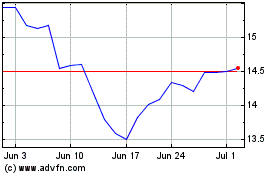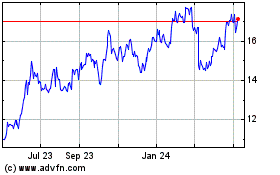Bill to Open Brazil's Offshore Oil Fields to Foreigners Still Faces Fierce Opposition
February 25 2016 - 7:50PM
Dow Jones News
RIO DE JANEIRO—Legislation to open coveted offshore oil fields
in Brazil to foreign players took a major step forward this week,
but still faces fierce resistance from opponents who consider the
measure an affront to the country's control of a prized natural
resource.
Brazil's Senate late Wednesday approved by a 40-to-26 vote a
bill aimed at spurring global competition for massive oil reserves
located in deep waters about 200 miles off Brazil's southeastern
coast. The bill still faces a potentially long battle in the lower
house, but the Senate approval was the strongest signal yet that
the bill has a chance at becoming law.
The proposed bill would change part of a 2010 law that requires
state oil giant Petró leo Brasileiro SA to be the lead operator and
hold at least a 30% share of any drilling projects in these
oil-rich fields. Instead, Petrobras would be offered the right of
refusal to control and drill each field before it was put up for
auction.
Proponents of the change say it could help attract fresh capital
from foreign oil companies, many of whom balked at the old rules,
and bring in more oil revenue for Brazil's government. It also
lifts a costly mandate from Petrobras, which has had to borrow
heavily to participate in pre-salt deals.
"The bill brings relief to Petrobras," said Joã o Augusto de
Castro Neves, an analyst at Eurasia Group in Washington, D.C. "It
removes one of the clouds looming over the company, because if any
field were put up for auction Petrobras had a mandate to bid."
The bill could go to the lower house as soon as next week,
though it could be months before a final vote is taken. It then
would go to the desk of President Dilma Rousseff, whose ruling
Workers' Party vehemently opposes the bill.
On Thursday, politicians on both sides of the bill were quick to
weigh in.
"There is a monumental crisis at Petrobras. Petrobras can't
afford developing the pre-salt on its own," said Marcus Pestana, a
member of the lower house from the opposition PSDB party. Mr.
Pestana supports the bill and says his party would work to get it
approved quickly.
Petrobras is the most indebted oil company in the world, with
total debt of 506.58 billion Brazilian reais at the end of its
third quarter, up 44% from the end of 2014 in local-currency terms.
And it is still dealing with the fallout from a giant corruption
scandal that resulted in a roughly $20 billion write-down and
during which several of its former executives were arrested. The
company has denied wrongdoing in the corruption scandal and said it
is cooperating with investigators.
Despite its recent troubles, Petrobras remains a symbol of
national pride for many Brazilians, and most of the Workers' Party
fiercely opposes the bill, painting it in stark terms as theft or
sabotage of a national resource that belongs solely to
Brazilians.
"We are against the bill. We think this is a strategic reserve
for Brazil and investment will come in the long run because now oil
is too cheap," said Paulo Teixeira, a congressman and the deputy
leader of the Workers' Party in the lower house. "Nobody is going
to explore [for oil] at current prices, it would be selling assets
too cheap."
The bill arrives at the house amid a fierce political battle
that could push the pre-salt bill to the back burner. Lawmakers are
considering the impeachment of Ms. Rousseff, who is accused of
using creative accounting to mask Brazil's fiscal troubles,
something she firmly denies. Congress is also distracted by a
widening corruption probe that has implicated several sitting
lawmakers.
The pre-salt rules date back to 2010, when oil prices were high,
Brazil's economy was booming and then-newly elected Ms. Rousseff
was looking to use some of the money flowing from oil profits to
boost social programs and to give Petrobras an edge against
competitors.
The most controversial of those changes were those relating to
so-called pre-salt fields, which lie beneath a thick layer of salt
hundreds of miles off the coast of Brazil.
Advocates cheered the move. But as oil prices fell and
Petrobras's debt pile continued to build, the pre-salt obligations
became more burdensome. Now the company is embarking on a
wide-ranging plan to divest $15 billion in assets by the end of
2016, and an additional $42 billion by the end of 2018.
"It's good news for Brazil, and it's been a longtime without
good news in Brazil," Adriano Pires, an oil consultant in Rio,
said. "It doesn't solve all of Petrobras' problems, but it improves
their outlook."
Write to Will Connors at william.connors@wsj.com and Paulo
Trevisani at paulo.trevisani@wsj.com
(END) Dow Jones Newswires
February 25, 2016 19:35 ET (00:35 GMT)
Copyright (c) 2016 Dow Jones & Company, Inc.
Petroleo Brasileiro ADR (NYSE:PBR)
Historical Stock Chart
From Mar 2024 to Apr 2024

Petroleo Brasileiro ADR (NYSE:PBR)
Historical Stock Chart
From Apr 2023 to Apr 2024
